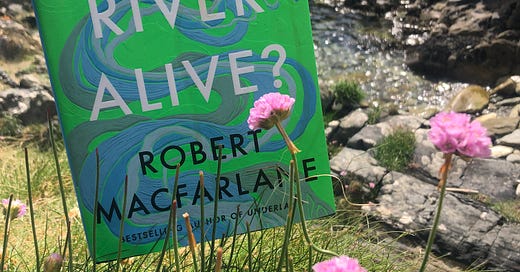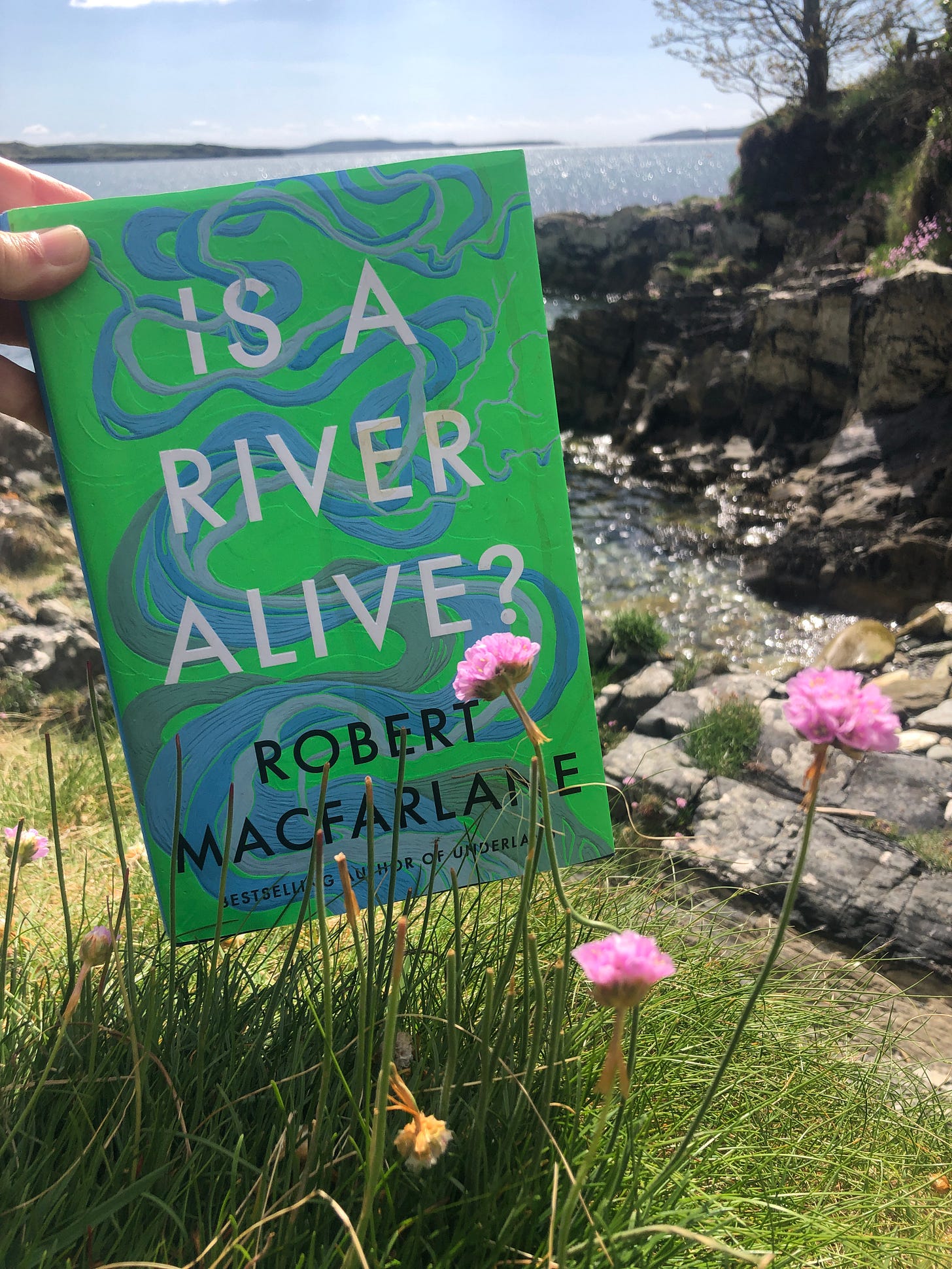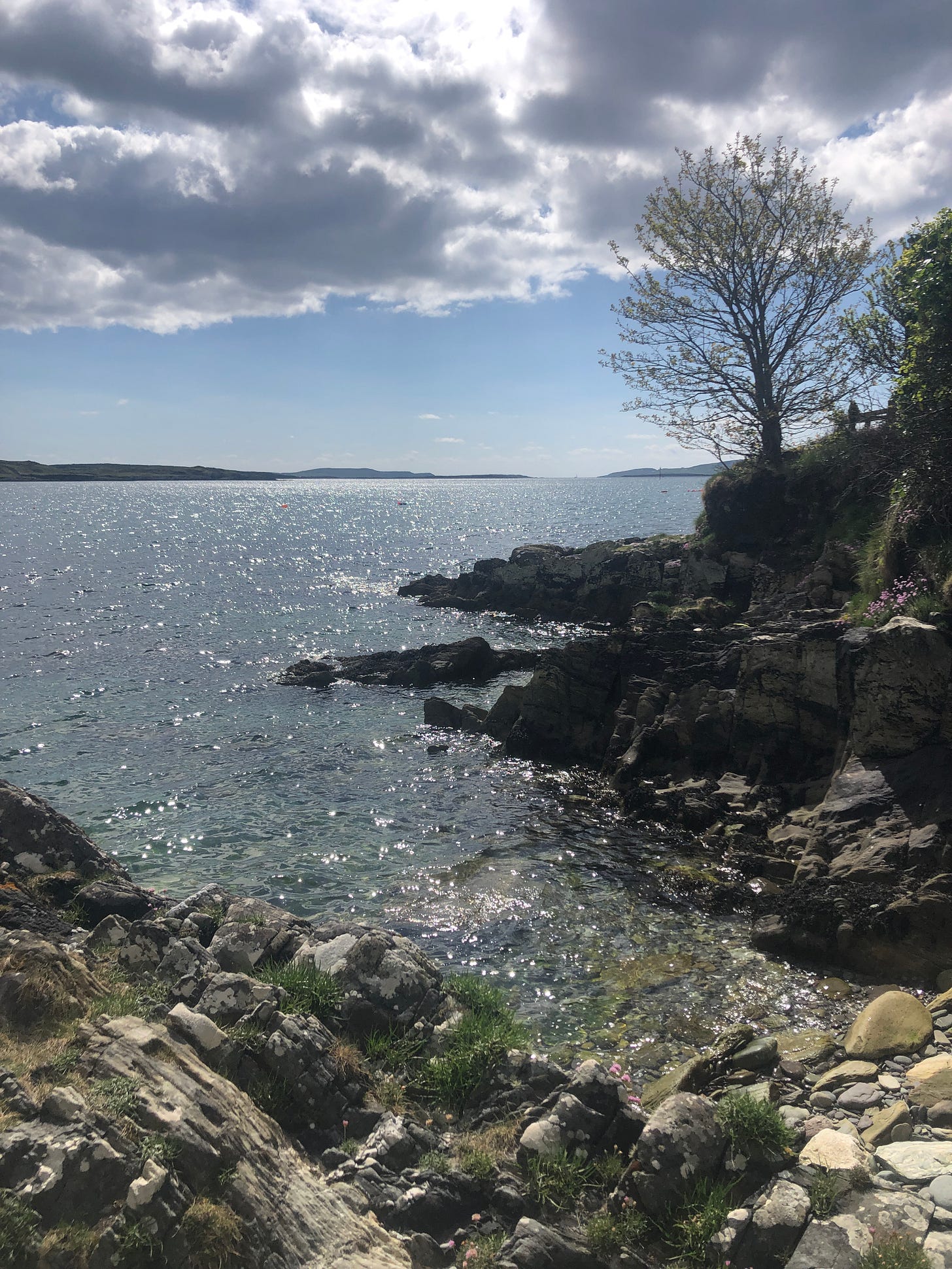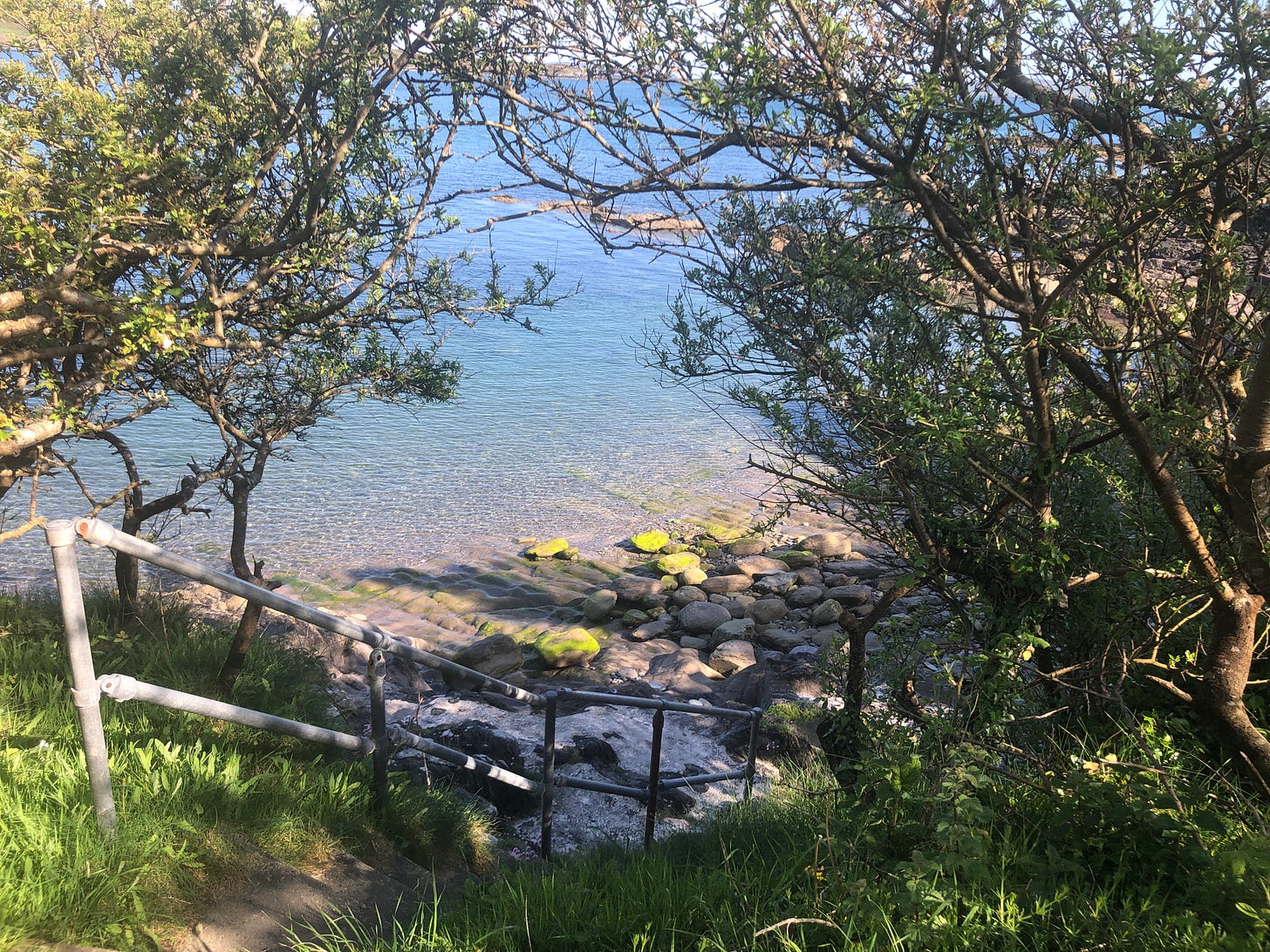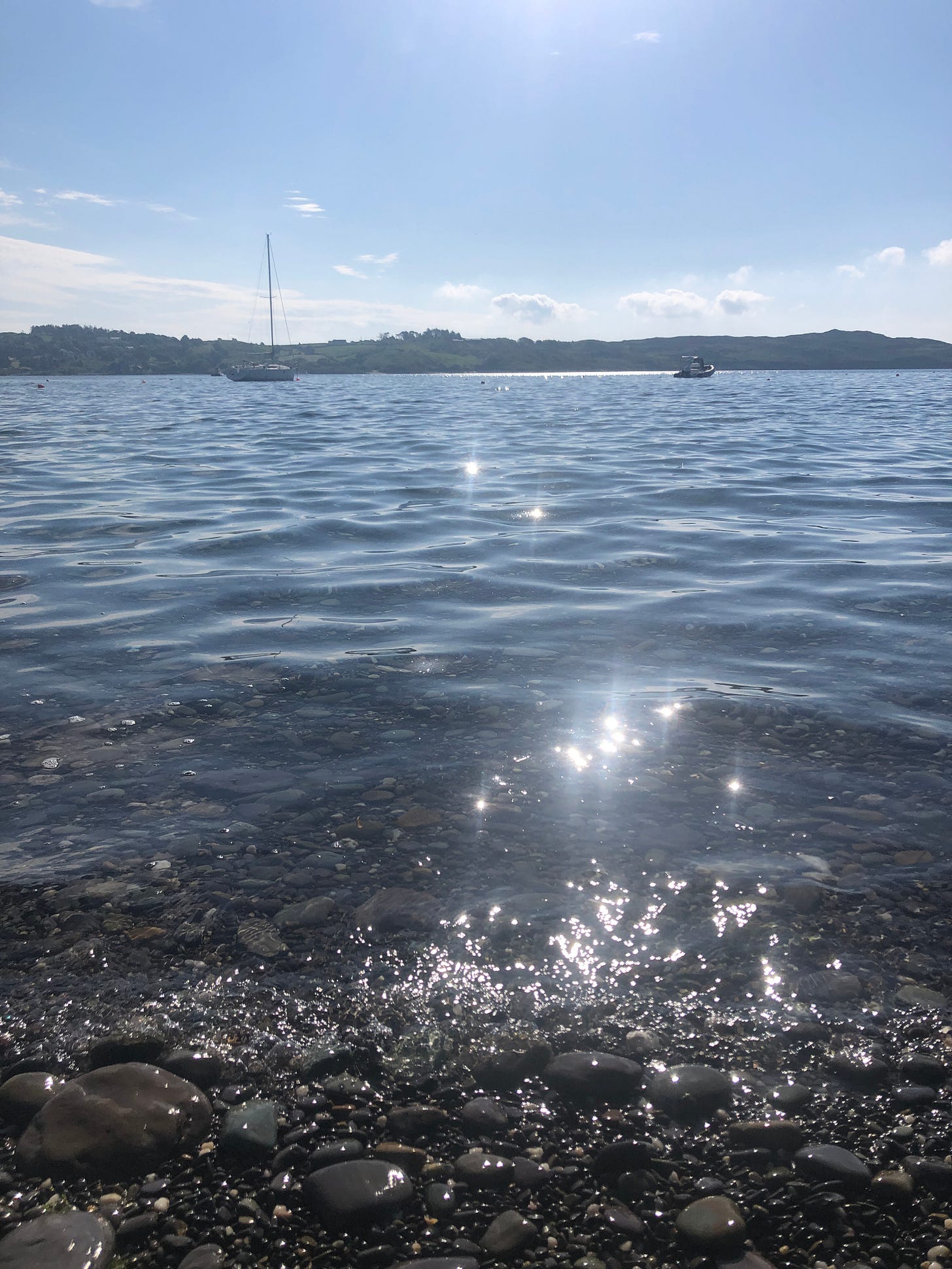Hello all
I am still coming up for air after the most wonderful of reads. Below I share a response. And below all that, some exciting news and happenings coming up on The Wild Edge this summer.
Hope you enjoy!
Clare x
This is more a book response than a book review. I often find reviews overly clinical, erring on the side of caution and calibration, in fear of sharing too much of what the book’s work has done on and to the reader. A review weighs and calculates; offers judicial distance. It seeks to find cracks and clinks, and interrogate the gaps. There can be stars and ratings as rationale of the critique, which can sometimes make or break the career of a writer. Analysis has its place of course, but often leaves me as a reader, lacking. I am generally more interested in the alchemy of the creative experience, as a reader, and also for the writer. How did reading or writing make us both see the world differently? How did it make us feel? Who are we now having come out the other side? How do we step into the world, changed or otherwise? The best books shape our minds, but I think also our lives. We are altered in some way, sometimes radically so. Readers and writers are just at different points on the creative cycle and can tap into the same current to fuel both onwards. And so, it is with this mind that I offer my own response, as a snapshot in time, which no doubt will evolve and change as the book continues to do its work on me.
And so, for today’s post, over to ‘Is a River Alive?, by Robert Macfarlane.
There are books we dip into, then those we may swim in. Occasionally, there are the ones we nearly drown in, becoming something else when we reach the other side, more alive to dangers and perils perhaps, but also ready to seize that aliveness, then live it more fully.
It’s about two weeks since I finished reading Robert Macfarlane’s latest book, Is a River Alive?, and I am just about resurfacing. Much of it was read in the sun, sitting, befittingly, on the shores of the Atlantic, a whole ocean lapping at my feet. What once was river, coming back to greet me, in words and in waves. Now, as I make my way onwards, I am thinking about water differently, and the little stream by my house, and the sea I swim in. I am thinking of the water I drink and the water I am. If anything, I am left with a sense: I am ever rivering.
At the source of the book is a powerful question. ‘Is a River Alive’?, and it’s this question which propels the narrative and Macfarlane’s own journey along an investigative adventure. With the unflinching skill of his pen, he takes us with him deep into the magical cloud forest of Ecuador, to the polluted rivers of Chennai in Southern India, down the Mutehekau Shipu or Magpie River of north-eastern Quebec, and to the chalk streams of his homeplace in Cambridge. We are also accompanied with sometimes gnarly and eccentric, sometimes mystical and mysterious, and always inspiring, smart guides who help illuminate the physical and political landscapes. And while it an intensely physical journey to encounter these rivers, Macfarlane simultaneously jettisons us into the heart of the Rights of Nature movement- a global legal and activism movement which seeks to give voice and legal rights and protections to these rivers. It’s an adventure worthy of a children’s epic, with brilliant heroic characters - human and otherwise, of almost impenetrable geography, of meetings with the monsters of mining and pollution, and ultimately of reslience. And like the best of children’s literary, it is a story of language, of love, of longing. It’s a book, in fact, to build a future on. Stick with it, and no matter your age, and it will help to take you there. In rivers we trust.
Macfarlane is a generous, erudite and daring narrator. That he wrote the book was testament to the fact that he actually survived the journeys, but there were several times along the way where I wondered if he or his guides would. Scaling dense jungle, descending rapids within rapids, he documents it all at the pace of a gripping page-turner but with the elegance of a prose poem. I am also glad the book came with a glossary. Words tumble and spin, spark and re-ignite, taking the shape and flow of the rivers themselves. As we too are taken, we cross into physical and intellectual landscapes — geology, cultural anthropology, law and legal studies, cartography, hydrology, mythology. There is a lot of ology, and it’s all the better for it. Towards the end, as the pace furrows fast, fullstops and pauses are ancillary. We each have to come up for air, and it’s totally exhilarating.
At the beginning of the book, I laughed when I read about his son Will’s response to the title, ‘Is a River Alive?, Will’s answer to which was a shrug and a natural, why of course it is: yes. We are reminded that to the child, animated habitats of forests, plains, mountains and seas, and of talking creatures and near mythical beings may be the stuff of fairytale but are also taken as a given. Rocks, rivers and animals have voice, and so yes, of course, a river is alive. Macfarlane also reminds us that we can find this same quality of unapologetic yes rooted in indigenous cultures around the world, where rocks, rivers, mountains, and forests can speak in a language all of their own. The animacy of ancient river gods, babbling brooks, water cures and holy wells means that to many cultures around the world, water is rendered sacred. (It make me think, of course, of the animacy embedded into the Irish language, and the much needed task of reclaiming this too). And yet, as Macfarlane explains, the embrace of this animated yes has become like many rivers themselves; a ghost, sent underground, out of sight, and concreted over to make way for the urban, a product of the industrialised era as much as the industrial mind. ‘Is a River Alive? attempts to take the question out of the shadows, and position it as a legitimate enquiry in the eyes of the law, and of the wild imagination. Perhaps, perhaps, we can speak it, sing it, write it back to life.
As the book flows on, more questions come to me. What is it to journey on, through, with, in bodies of water, our own, others. I am thinking that breath was once river, soon ocean. We too are rivers. Can we re-learn how to flow? I think of that beautiful line from John O’Donohue,
I would love to live like a river does, carried by the surprise of it’s own unfolding.
I have a sense as I unravel with the read, that Macfarlane was too. In his quest for a grammar of animacy (as inspired by the work of Robin Wall Kimmerer), that is, for finding language which does not distance life around us, but instead embeds us closer in kinship, that he too is finding kin in the rivers he is tracking and the one he is finding in his mouth. From the latter, his language begins to unhook itself from convention, and deposit its own fullstops and traditional grammar markers along the way. We are left with sentences which pop and sing, elevating what language can be, can do. I read some of these sentences aloud to the sea beside me, then swam in it, quite literally.
As I came out, of the sea, of the book, shaking myself off, I have a sense of having been in the presence of mastery. The book is a masterclass, for sure, in narrative non-fiction, in nature writing, in bringing people and place alive. But it’s not only the people and places who Macfarlane is writing about that become alive, it can be the reader too. He leaves us not with easy resolution either, but with a potential quest. In the acknowledgment and aftermaths section of the book, there is a quote from his friend and fellow writer, Alexis Wright, which he has printed out to keep at hand. I in turn, wrote it out and have pinned it to my desk:
‘The world desperately needs powerful storytellers to help us make sense of the unfathomable events taking place. And while sitting in eternity, the very old ones will be impressing into the minds of these future writers a way of figuring out how to bring life back into the laws of the creative beings in the sand desert and the seas, how to bring life back into the waters, the mountains and skies, the flatlands and plains, back into the bushland, the forests, the thunder and winds, back into the trees, and the animals’.
How to bring life back?
The right quest is in the right question.
Perhaps, perhaps, we can speak it, sing it, write it back to life.
It is a perhaps I will be travelling with, as I swim, as I write, as I breathe: totally and utterly riveted and rivered.
Thank you Robert Macfarlane, and your guides, for this incredible book. It’s a gift for these times. It’s a life raft too. Thank you. Thank you. Thank you.
For paid members at the end of this post you will find and additional prompt, inspired by the book to get us thinking about our own relationship to rivers in our own lives.
Coming up on The Wild Edge
Owl Hours- Creative Practice Circles:
Find focus and flow, commit time to your creative projects, and connect with others.
29 May, Thursday 8-9pm GMT+1 (Irish time): Owl Hour
5th June, Thursday 8-9pm GMT+1 (Irish time): Owl Hour
Poetry Salon
An hour to savour the spirit of poetry.
8th June, Sunday 6-7pm GMT+1 (Irish time): Poetry Salon
Summer Solstice Salon:
Marking the Summer Solstice, I’ll be hosting a special seasonal salon on June 20th with poems, prompts and creative ritual. Tickets are included in the ‘Gold/ Founding Membership’ of The Wild Edge, or can be purchased below.
And announcing..
Focus&Flow will be available to all to follow along, and live sessions and recordings will be available to paid members. It is a week to really dive into a creative project. I will be offering daily prompts, live co-creation sessions, an ideas to action cafe, and there will be an opportunity to showcase your work in progress at the end.
More on this soon, but for the moment, save the dates! July 14th-18th.
Paid members, below a prompt to help us reflect upon our relationship to rivers….
Listen to this episode with a 7-day free trial
Subscribe to The Wild Edge - with Clare Mulvany to listen to this post and get 7 days of free access to the full post archives.


